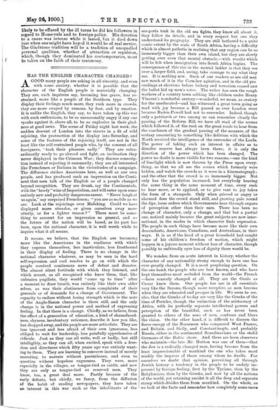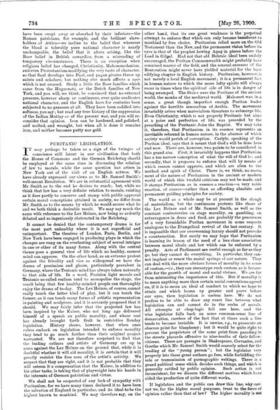HAS THE ENGLISH CHARACTER CHANGED ? I i i. GOOD many people
are asking in all sincerity, and even with some anxiety, whether it is possible that the character of the English people is materially changing. They are, such inquirers say, becoming less grave, less re- strained, more like a people of the Southern type. They display their feelings much more, they rush more in crowds, they are more swayed by rumour, by fear, and by emotion. It is unlike the English, they say, to have taken up this war with such enthusiasm, to be so unreasonably angry if any one speaks against it, above all, to be so explosive in their glad- ness at good news. The scene of Friday night last week, the sudden descent of London into the streets in a fit of wild rejoicing, the protraction of the display into Saturday, and some of the features of the rejoicing itself, are not in the least like the self-restrained people who, by the consent of all foreigners, "took their pleasure sadly." They are extra- ordinarily ready to go abroad and fight, an inclination they never displayed in the Crimean War; they discuss conscrip- tion instead of rejecting it summarily; they are all interested like Frenchmen or Italians in the vicissitudes of a campaign. The difference strikes Americans here, as well as our own people, and has produced such an impression on the Conti- nent that men talk of the English as of a people changed beyond recognition. They are drunk, say the Continentals, with the " heady " wine of Imperialism, and will enter upon some entirely new and probably dangerous career. "Never laugh at us again," say surprised Frenchmen; "you are as mobile as we are. Look at the rejoicings over Mafeking. Could we have displayed more abandon, or given ourselves away more utterly, or for a. lighter reason P" There must be some- thing to account for an impression so general, and as the future of the nation will be based, as its past has been, upon the national character, it is well worth while to inquire what it all means.
It means, we believe, that the English are becoming more like the Americans in the readiness with which they express themselves, less inarticulate, less frostbound in their display of feeling. There is no change in the national character whatever, as may be seen in the hard self-repression and cool resolve to go on with which the people received continuous news of defeat and disaster. The almost silent fortitude with which they listened, and which meant, as all recognised who knew them, that, like unbeaten pugilists, they would "come up to time" after a moment to draw breath, was entirely like their own older selves, as was their abstinence from complaints of their generals or of demands for a change of Government. The capacity to endure without losing strength which is the note of the Anglo-Saxon character is there still, and the only change is in the national power and method of expressing feeling. In that there is a change. Chiefly, as we believe, from the effect of a generation of education, a kind of shamefaced- ness, shyness, involuntary reticence, describe it how you like, has dropped away, and the people are more articulate. They are less ignorant and less afraid of their own ignorance, less obliged to wait for leadership, less painfully apprehensive of ridicule. Just as they can all write, well or badly, but still intelligibly, so they can all, when excited, speak with a free- dom and directness which fifty years ago WSW entirely want- ing to them. They are learning to converse instead of merely narrating, to narrate without parentheses, and even to question without hopeless vagueness. They were, more especially in the villages, as tongue-tied as cattle, and now they are only as tongue-tied as reserved men. They know, too, a great deal more. Partly because of the early defeats, but chiefly, we fancy, from the diffusion of the habit of reading newspapers, they have taken an interest in this war such as the inhabitants of the sea-ports took in the old sea fights, they know all about it, they follow its details, and in every respect but one they understand its geography. They are still bothered to a quite comic extent by the scale of South Africa, having a difficulty which is almost pathetic in realising that any region can be so immensely bigger than their own island, but they are slowly getting over even that mental obetacle,—with results which will be felt when immigration into South Africa begins. The consequence of this rise in the mental ladder is that they see over a larger field, and, seeing, take courage to say what they see. It is nothing new. Such of our readers as are old mer saw much of it in the Corn-law agitation, and in the old pro ceedings at elections before bribery and terrorism ceased a.no the ballot hid up men's votes. The writer has seen the rough workers of a country town sobbing like children under Henry Vincent's wonderful oratory—wonderful, we mean, as oratory for the uneducated—and has witnessed a great town going as mad with joy because a Bill passed as ever London went because Baden-Powell had not to surrender. Indeed, though only a patriarch or two among us can remember clearly the passing of the Reform Bill, we have all read of the scenes which followed it, of the rush on the great roads to hear from the coachmen of the gradual passing of the measure, of the ecstasy amounting to something like delirium with which the North received the intelligence of the surrender of the Lords. The power Of taking such an interest in affairs as to dissolve reserve has always been there ; it is only the direction of the power which has been changed. The power no doubt is more visible for two reasons,—one the kind of limelight which is now thrown by the Press upon eVery- thing, so that we all see the scenes which formerly were hidden, and watch the crowds as it were in a kinematograph ; and the other that the crowd is so immensely bigger. Not only has the population increased, but everybody hearing the same thing in the same moment of time, every rush to hear more, or to applaud, or to give vent to joy takes the form of a stampede. Only when grieved or angry or alarmed does the crowd stand still, and growing pale round the lips, issue orders which Governments hear through organs of perception other than their ears. There has been no change of character, only a change, and that but a partial one, noticed mainly because the great subjects are now inter- national, in the modes in which character finds expression. The people in such things have become more like their own descendants, Americans, Canadians, and Australians, in their ways. It is as if the head of a great household had caught some of his children's freedom of motion, which might happen in a joyous moment without loss of character, though possibly to unfriendly eyes loss of dignity there would be.
We wonder, from an acute interest in history, whether the character of any nationality strong enough to have one has ever greatly changed. It is a most perplexing question. On the one hand, the people who are best known, and who have kept themselves most secluded from the world—the French —have scarcely changed at all. They are the Gauls as Ccesar knew them. Our people too are in all essentials very like the Saxons, though more receptive, as men become when they are educated and prosper in life. We seem to see, also, that the Greeks of to-day are very like the Greeks of the time of Pericles, though the extinction of the aristocracy of Attica, with its perfectly separate intellectual powers and perception of the beautiful, such as has never been granted to others of the sons of men, confuses and blurs the vision. On the other hand, it is difficult to discern the fierce energy of the Norsemen who conquered West France, and Britain, and Sicily, and Constantinople, and probably Russia, either in the sentimental Scandinavians or the stolid Germans of the Baltic shore. And there are keen observers who maintain—the late Mr. Hutton was one of them—that the Jew is a radically changed man, having become from the least impressionable of mankind the one who takes most readily the impress of those among whom he dwells. For ourselves we doubt that opinion, perceiving all through Jewish history a tendency in the people to be unduly im- pressed by foreign feeling, first by the Tyrians, then by the Babylonians, then by the Greeks, and now by all the nations of the world, yet retaining amidst it all the deep and separate stamp which divides them from mankind. On the whole, as we look at the facts and remember how completely some races
Lave been swept away or absorbed by their inferiors—the Roman patricians, for example, and the brilliant slave- holders of Attica—we incline to the belief that wherever the blood is tolerably pure national character is nearly unchangeable, the belief that it alters arising, like the Boer belief in British cowardice, from a misreading of temporary circumstances. There is an exception when religious belief has changed, Christianity, Mahommedanism, and even Protestantism modifying the very roots of character, so that Saul develops into Paul, and pagan pirates throw up saints and scholars; but nothing else much affects a race which is not crossed. Study a little the Boer families which came from the Huguenots, or the Dutch families of New York, and you will, we think, be convinced that no external pressure, however sharp or continuous, ever quite eradicates national character, and the English have for centuries been subjected to no pressure at all. They have been coddled into softness, you say ; but read any true history of the suppression of the Indian Mutiny or of the present war, and you will re- consider that opinion. Iron can be hardened, and polished, an melted, and wrought, but when all is done it remains iron, and neither becomes putty nor gold.







































 Previous page
Previous page